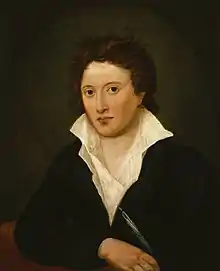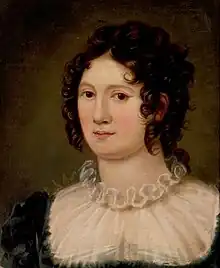Amelia Curran | |
|---|---|
| Born | 1775 Ireland |
| Died | 1847 (aged 71–72) Rome, Italy |
| Nationality | Irish |
| Known for | Portrait painting |
Amelia Curran (1775 – 1847) was an Irish portrait painter.
Biography


Amelia Curran was the eldest child of the barrister and wit John Philpot Curran and his wife Sarah Creagh.[2] Her sister Sarah Curran was the fiancée of Robert Emmet. Amelia was a member of the Church of Ireland for the early part of her life. In 1810, through her father, she met novelist William Godwin [3] and Aaron Burr, the American politician. Soon after, she met her lifelong friend, Percy Bysshe Shelley.
In 1812 Percy Shelley traveled to Ireland to campaign against the injustices done there under British rule and was introduced to her father.[3][4]
Curran also painted a portrait of Shelley's three-and-a-half-year-old son William (called "Willmouse") in Rome, just before Willmouse's death from malaria in 1819.[3][5]
She later traveled to Rome and built up a close friendship and correspondence with Shelley's second wife Mary.[6] In 1821, Curran moved to Naples, where she converted to Catholicism. Moving to Paris the next year, it was falsely rumored that she had married and separated from a man. Curran returned to Rome in 1824 to spend the rest of her life.
Curran painted Shelley several times.[1] These are among the few paintings of Shelley painted in his lifetime, and the only ones of him in his adulthood which was copied by several artists including Alfred Clint[7] and William Holl[8] among others.[9] They are noted for their androgynous features, and their striking similarity to Guido Reni's painting of Beatrice Cenci, which was one of the poet's favorite pictures. Curran's 1819 portrait of Shelley[10][1] was included in the 1905 book Women Painters of the World and hangs at the National Portrait Gallery in London.[6][11]
Curran also painted a portrait of Claire Clairmont[12] and made copies of several Renaissance Madonnas. During the same spring of 1819 when painting William Shelley, Curran received Percy and Mary Shelley for individual portraits along with Clairmont.[3] Curran knew Mary and Clair as the stepdaughters of William Godwin since their childhood, from visiting their London home with her father.[3][13]
Amelia Curran died in 1847 in Rome, and was cremated to rest in the Church of St. Isidore. The future Cardinal Newman presided at her funeral Mass.
References
- 1 2 3 Curran, Amelia. "Percy Bysshe Shelley | Art UK". www.artuk.org. Retrieved 24 October 2019.
- ↑ Amelia Curran in Bénézit
- 1 2 3 4 5 Polack 2011, p. 25.
- ↑ Bieri & Shelley 2008, p. 196.
- ↑ Bieri & Shelley 2008, p. 455.
- 1 2 Amelia Curran in the National Portrait Gallery, London
- ↑ Clint, Alfred. "Percy Bysshe Shelley". www.npg.org.uk. National Portrait Gallery. Retrieved 24 October 2019.
- ↑ "Percy Bysshe Shelley". www.npg.org.uk. William Holl Sr, or William Holl Jr. National Portrait Gallery. Retrieved 24 October 2019.
{{cite web}}: CS1 maint: others (link) - ↑ Finden, William. "Percy Bysshe Shelley". www.npg.org.uk. Black & Armstrong (pub), 1819; stipple and line engraving. National Portrait Gallery. Retrieved 24 October 2019.
- ↑ "Newstead Abbey | Discover Artworks". Art UK. Retrieved 24 October 2019.
- ↑ Women Painters of the World on Project Gutenberg
- ↑ Curran, Amelia. "Claire Clairmont (1798–1879) | Art UK". www.artuk.org. Retrieved 24 October 2019.
- ↑ Sunstein 1989, p. 58.
Bibliography
- Bieri, James; Shelley, Percy Bysshe (2008). Percy Bysshe Shelley: a biography. Baltimore: Johns Hopkins University Press. p. 196. ISBN 9780801888601. OCLC 487612237.
- Polack, Fiona (2011). "Amelia Curran's Newfoundland Painting". Keats-Shelley Journal. 60: 25–29. ISSN 0453-4387. JSTOR 41409553.
- Sunstein, Emily W (1989). Mary Shelley: romance and reality. Boston, Mass.; Toronto; London: Little, Brown. p. 58. ISBN 9780316822466. OCLC 463438395.
Further reading
External links
![]() Media related to Amelia Curran at Wikimedia Commons
Media related to Amelia Curran at Wikimedia Commons
- 2 artworks by or after Amelia Curran at the Art UK site